Commentary
What I Learned from Joe Biden 45 (Gulp!) Years Ago
Why The Lessons Give Me Hope for 2022
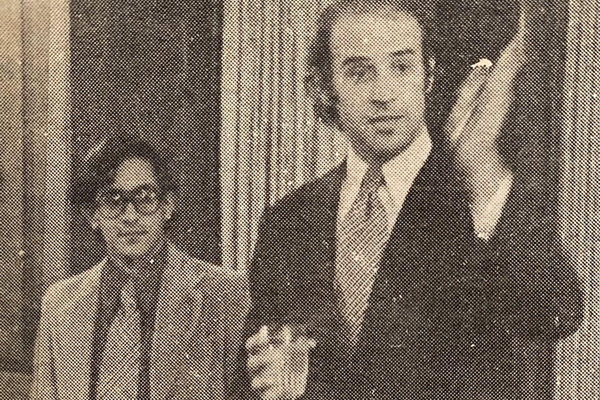
The twin threats that still loom over us — the anti-democratic radicalization of the Republican Party and the persistence of the pandemic — are making this a tough time to appreciate the many first-year successes of the Biden Administration.
We are in an undeniable moment of peril and there is every reason for alarm, but also for hope. I will continue beating the drum on the urgency of passing measures such as the John Lewis Voting Rights Advancement Act, the Freedom to Vote Act, the Protecting Democracy Act, and the Judiciary Act, as well as holding those attacking our democracy accountable.
And in this end-of-year piece, I reflect on how what I learned from President Biden so many years ago gives me hope that in 2022 we can turn a corner. We can prevail in the work of defending and righting our democracy.
It was the summer of the Bicentennial. The summer I first saw a fax machine (which, during several minutes of noise, laboriously spooled out, on a curl of smelly, waxy paper, documents arriving from Wilmington to Washington). The summer after my sophomore year in college. The summer of 1976, when I interned for a then-wunderkind senator named Joe Biden.
Even as a kid, I was into history and politics. I knew that Biden, at the age of 29 — still too young to serve — had defeated a seemingly unbeatable incumbent. I was aware of the horrible car accident following his election, and how he rode back and forth by train to be there with his two little boys at bedtime. I watched Biden become “a liberal who breaks ranks” (as I described him in my diary), a gregarious, energetic, precocious, ambitious young senator.
My diary from 1976 shows me also to have been energetic, precocious, and — sometimes cringe-worthily — ambitious. I had a diverse network of friends and roommates. Despite a cascade of plays, movies, lectures, pleasure reading, and other distractions catalogued in my diary, I was excelling academically. I had succeeded in winning election as Speaker of the Yale Political Union, climbing to the top of the greasy pole among the other greasy pols at a school full of wannabes. And as my diary recounts, in blow by blows, 1976, as it happened was also the year I first had sex. With a woman.
When I reread the diary now, I am struck by how much this 19-year-old kid was doing, how well he was doing, how insightful and passionate he was about so much. And that, indeed, is how I’ve long remembered that year — a time of growth, accomplishment, and adventure.
But the diary also records what I had forgotten: so much second-guessing and self-doubt, a sense of losing ground and erratic confidence, critiques of my friends and myself… so much yearning outpacing my undeniable striving. I had forgotten how much perspective I did not have then on what really mattered, even as I was doing stuff that mattered and wrote endlessly in the diary about wanting to matter.
One of the things I wanted back then was to land a job in Washington. And so I was thrilled when the hotshot young Senator Biden agreed to come speak to the Political Union. After presiding, as Speaker, over his appearance, I wrote in my diary:
February 10: Senator Biden was impressive tonight. Young, energetic, warm, and intelligent. Egotistical to some extent…. I want to work for him…. I want a summer job in DC. This is important, unlike the Speakership. It’ll show that my credentials stand up in the ‘real world’ and will be that critical initial involvement leading to other jobs.
Over the next couple months — while juggling impressive courses and activities, and wrapping up the Speakership — I wrote letters, made calls, and even traveled to DC in hopes of securing an internship. My diary displays the determination and idealism with which, in the midst of my studies and activities, I pursued that ambition. For instance:March 8: A day of firsts and things that would have been orgasmic at one point in my life. Lunch with a congressman (we talked politics and then job), going on the floor of the House, sitting in the Speaker’s chair and standing at the podium where Truman gave the Truman Doctrine speech, where State of the Union speeches are given. Riding in Members Only elevators, hobnobbing with Senator Biden like a friend [but] no definite job…. Biden and I are becoming real chummy. His AA asked me back tomorrow, as the Senator and I kibitzed our time away. Good luck. I want a job so badly….
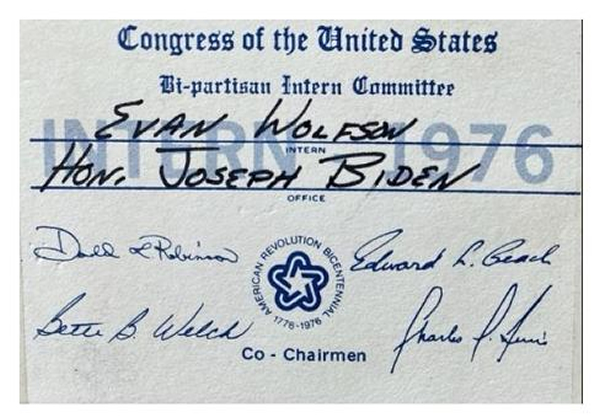
Then, on April 20, I got the call.
For the next several months, my diary contains voluminous descriptions of an exciting, busy Bicentennial Summer in DC, and my thrills, frustrations, and aspirations as a witness to, and sometime participant in, the activities of an office of a Senator on the go. The numerous entries tended to go like these:
May 25: Attended my first Foreign Relations Committee hearing…. I sat on the stage behind the Senators and entered through the private doors. Funny how when I see the sign STAFF on the elevator, I almost turn away until I realize and then get a kick out of it…. Am going to slowly widen my activities until they see I’m reliable and capable. Did some press work (phoning in ‘actualities,’ quotations on tape from Biden…to radio stations in Delaware). I used a computer research machine, ‘Scorpio,’ to read a report on Rhodesia and took such stuff out on own initiative this evening, having ordered it from the Library of Congress. Tomorrow — sale of nuclear reactors. Must remember that my goal this year should be to know how an office and Congress run…not to make policy. I have eleven years (at least) to go on that….
June 3: To my great joy, I was assigned as the Intern for Foreign Relations. I’ve handled some relatively thorny constituent requests…. I also decided that the only way I would advance from office work (not exactly crap, but not policy-making either) would be to take initiative and show them what I can do. I figured that the one thing I know I’ve gotten from a Yale education that I would not have gotten on my own is the ability to write quickly and well. So, I made impressive inquiries at the Congressional Research Service, including a jaunt to the Library of Congress (where my researcher was shocked and probably a little annoyed to discover that I was younger than he, and not a Legislative Assistant) …. I submitted it to my L.A. [legislative assistant], a former C.I.A. guy who knows everyone in the foreign relations business (!); he seemed pleasantly surprised. I hope he’ll consider it good and timely enough to: A) submit it to Biden, and B) warrant including me, at least as an observer, in the substantive areas of senatoring.
June 9: Started work at Roy Rogers [where I moonlit nights to make some money during that unpaid summer internship].
July 21: Was walking down the hall to the Foreign Relations Committee when [Vice Presidential nominee Walter] Mondale popped out (he has the office right across from us). He began walking right in front of me, and the TV people ran backwards ahead of us with bright lights and cameras. I was flanked with Secret Service — and hadn’t even tried to get into the picture! Couldn’t have done better if I’d tried. Had a low today, too: had to go pick up the Senator’s lunch. Although LA’s do it (and in other offices, it’s one of the high points of an intern’s day), it still rankled.
Even during that long-ago summer, I noted firsthand how much Biden cared about policy and government across a broad range of areas, tapping many sources of expertise and input, putting in the work. I wrote on June 16 that the Senator “does look at every single letter that goes out with his signature. He also rejects drafts and demands a lot — rightfully so.” I saw how engaged he was, and what a people person.
One diary entry, for instance, gives the flavor, recounting an outing at the beach with the Senator and the woman he was then dating whom I was introduced to as Jill — now our First Lady Dr. Jill Biden — whom I liked right off the bat and every time I was with her.
August 1: Yesterday…I went to Delaware to spend time at the Biden picnic for volunteers and supporters…. What a folksy state. The Senator running around clowning and taking pictures in his bathing suit, splashing with his kids in the water. The Governor [Sherman Tribbitt]– ‘howaya, Sherm’ — in loafers and short sleeves walking on the sand. Me playing ‘football’ with Beau and Hunt Biden (7, 6), then taking them in the cold ocean, counting continually to make sure — like a camp counselor — that there were 5 kids all the time, heads above the water and all….The kids gave me something to do other than fawn on the Senator, as I knew very few of the people there. At one point the Senator grabbed me and made a joke about Yale; I had walked in front of someone taking a picture with him — boy, was I embarrassed. He and I bantered a little, in and out of the water — but I still am not sure he knows my name… I still don’t know where I stand. I so want to be a part of things…
Back at school in the fall, I stayed in touch with the Senator’s office, and occasionally heard from him as well — treasuring every contact.
September 27: Got a nice note from Biden…. He says that he is glad I took him up on the suggestion that I keep in touch with ideas for legislation. He said, ‘You have always been a reservoir of ideas. [!] … In light of all your outside interests, I trust your studies are not suffering. Keep in touch… Joe.’
Soon, though, my diary reveals that I was busier than ever — juggling highs and lows of friendships, teaching Sunday School, and diving into a new role as Yale campus co-coordinator for the Carter-Mondale campaign, all while shouldering another challenging course load (my favorite semester at college, it turned out). And throughout, figuring out for myself what it was going to mean to be gay.
Of course, 1976 was a long time ago, and very early in my life. Still ahead of me lay graduating college and law school; the Peace Corps; decades of lawyering and activism; founding and leading the successful and transformative campaign to win the freedom to marry; teaching at Georgetown and Yale; close circles of friends (including, still, the college roommates I had written and worried about, and now, our respective spouses and partners); uncle-hood; travels; and a happy marriage to the man I love. In 1976, I had no way of knowing that this was what life held in store for me — but as I reread the diary, I can see now that the 19-year-old me was finding his way to at least two major lessons that have shaped my life (and been hallmarks of my work) ever since.
First, I learned that year that greatness as in “I want to be great” comes, if at all, from actual service, making a difference for others, rather than from the credentials and things I’d begun the year by pursuing — to be Speaker of the Political Union, or to be in politics for the sake of glory or even attention. I discovered that after striving to get elected Speaker, the actual position didn’t feel as worthwhile as I had thought it would, whereas engaging in debates (and meeting visitors like Biden), my grunt work organizing the campus and helping deliver a Connecticut win for Jimmy Carter, teaching students at Sunday School, and digging as an intern into substantive research — not to mention my actual studies — felt gratifying and proved meaningful.
I was learning for myself the lesson best conveyed in my favorite speech of Martin Luther King, Jr.’s, the one I hang on the wall of every office I’ve had. When they give my eulogy, Dr. King said, “tell them not to mention that I have a Nobel Peace Prize — that isn’t important. Tell them not to mention that I have three or four hundred other awards — that’s not important. Tell them not to mention where I went to school…. I’d like somebody to mention that [he] tried to give his life serving others… tried to love somebody. [All] of the other shallow things will not matter…. I just want to leave a committed life behind.”
My diary shows me learning another lesson, too: the power and affirmation that come from not wallowing in the negative, from being hopeful, from focusing on the pathway not the problem, from being kind — to others, and to myself.
While I wince at the young me’s sometimes shallow ambition and excessive judgment (“fancied greatness,” as another hero, Abraham Lincoln, described his youthful sense of self), I am simultaneously proud of what the young me was actually doing — even as he wrestled with what it meant and where he wanted to go. As the young me learned that year to pursue a committed life in a meaningful way, and to be charitable toward others, so older me is again reminded to be kind to my young self, too.
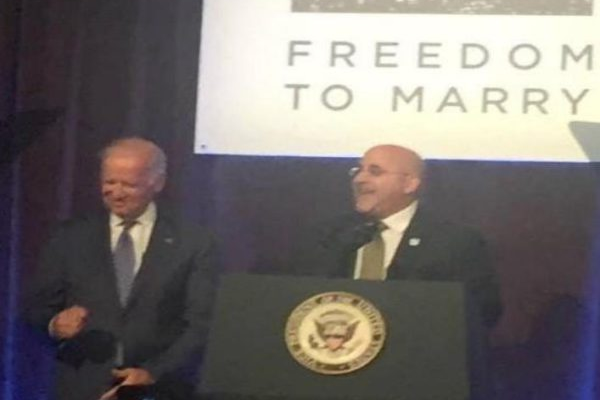
I last spent real time with Joe Biden when the then-Vice President spoke to the more than 1000 advocates and celebrants at Freedom to Marry’s Victory Celebration on July 9, 2015.
“Let me begin by saying I take full credit for Evan” were Biden’s opening words (greeted by laughter). He then shared lessons he’d learned from his father about love, his evolution in understanding gay people, and how he came to support the freedom to marry — even getting out in front a bit to help nudge the Administration along. He recalled his pivotal Senate role in defeating the anti-gay Robert Bork, nominated by Reagan to the Supreme Court. That, in turn, led to the appointment of Justice Anthony Kennedy instead, who went on to write the marriage victory we had worked for and were celebrating.
“In 1983, there was a Harvard Law essay making the constitutional case for marriage equality written by a young man,” Vice President Biden told the audience. “He said, ‘Human rights illuminate and radiate from the Constitution, shedding light on the central human values of freedom and equality.’…. That was the basis upon which I took on Judge Bork.”
“These were not words from an illustrious Supreme Court Chief Justice,” Biden concluded. “These are the words written by Evan Wolfson when he was in law school. Pretty courageous for a 26-year-old kid at Harvard Law School when the future looked so dark and lonely.”
Whether or not his former intern’s law school thesis on marriage, written just a few years after my internship, really had been top of mind in Biden’s thinking as he took on Bork and continued his Senate career, I still appreciated his generosity. It was yet another example of what I know I really learned from him.
When I endorsed him for president, I wrote that “Biden [sometimes] got things I cared about wrong — even, initially, my own work to win the freedom to marry. But, crucially, he has also always shown a willingness to listen and learn, an eagerness to explore new approaches and syntheses, a capacity to empathize and evolve.”
“I have seen firsthand,” I added, “how, unlike Trump, Joe Biden cares about governing, knows how the government works, and will work through it, not war on it…. Biden’s concern for people and deep knowledge and experience give him the ability to bring people together” and to deliver on good ideas to restore our democratic possibilities.
From a wunderkind senator, the embodiment of ambition, Joe Biden came to embody virtues of empathy, faith in government, and hope as a politician, candidate, and now, our president. On him now — and on us — literally rests the future of America as a democracy.
I can’t claim to know President Biden well enough to know every bit of his inner thinking, but from what I’ve experienced in interacting with him , it’s clear that in his own way, too, Joe Biden learned what I began learning under his tutelage: A committed life is found not in just the ambition to be great, but the ambition to “do great” — to do for others. To persevere and put in the work. To listen and to grow. To be kind. To be hopeful, and to convey hope. And, too, and always, the personal matters.
Now, heading into 2022, we must redouble our efforts to help (and push) President Biden and all true democrats. Together we must rally enough Americans to defend liberal democracy, reach for justice, combat inequality, and build America back better. We have to persuade, organize, hang in, maneuver, mobilize, and vote. What I learned as a college kid, and since, sustains my belief that we Americans can, yet again, meet the call to action and rise to the great work this moment and history require.
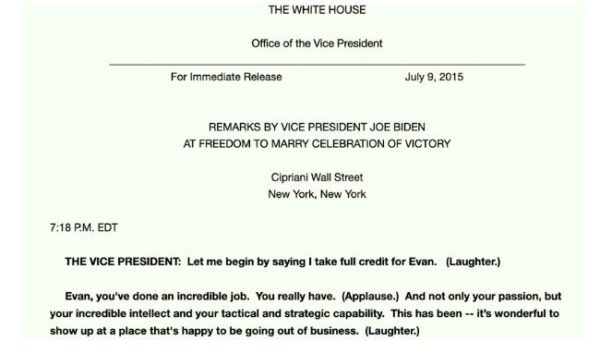
Vice President’s Remarks, Freedom to Marry Victory Celebration, July 9, 2015
*********************
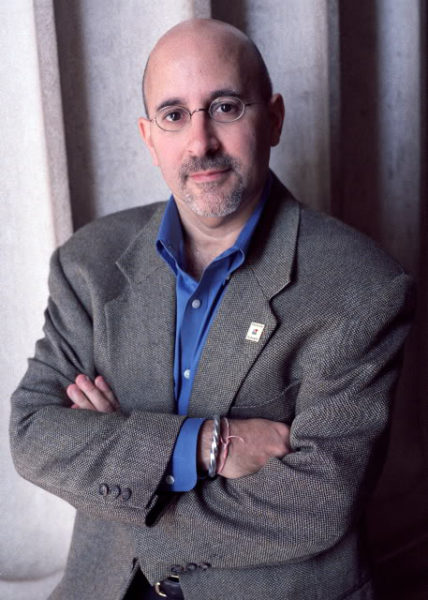
Evan Wolfson led the campaign to win the freedom to marry for same-sex couples. Since victory in 2015, he advises and assists diverse movements in the US on “how to win,” as well as activists seeking to win marriage in other countries worldwide.
*********************
The preceding piece was previously published on Medium and is republished with permission.
Commentary
Fight against TERFs goes global
UK Supreme Court on April 17 ruled legal definition of ‘woman’ limited to ‘biological sex’
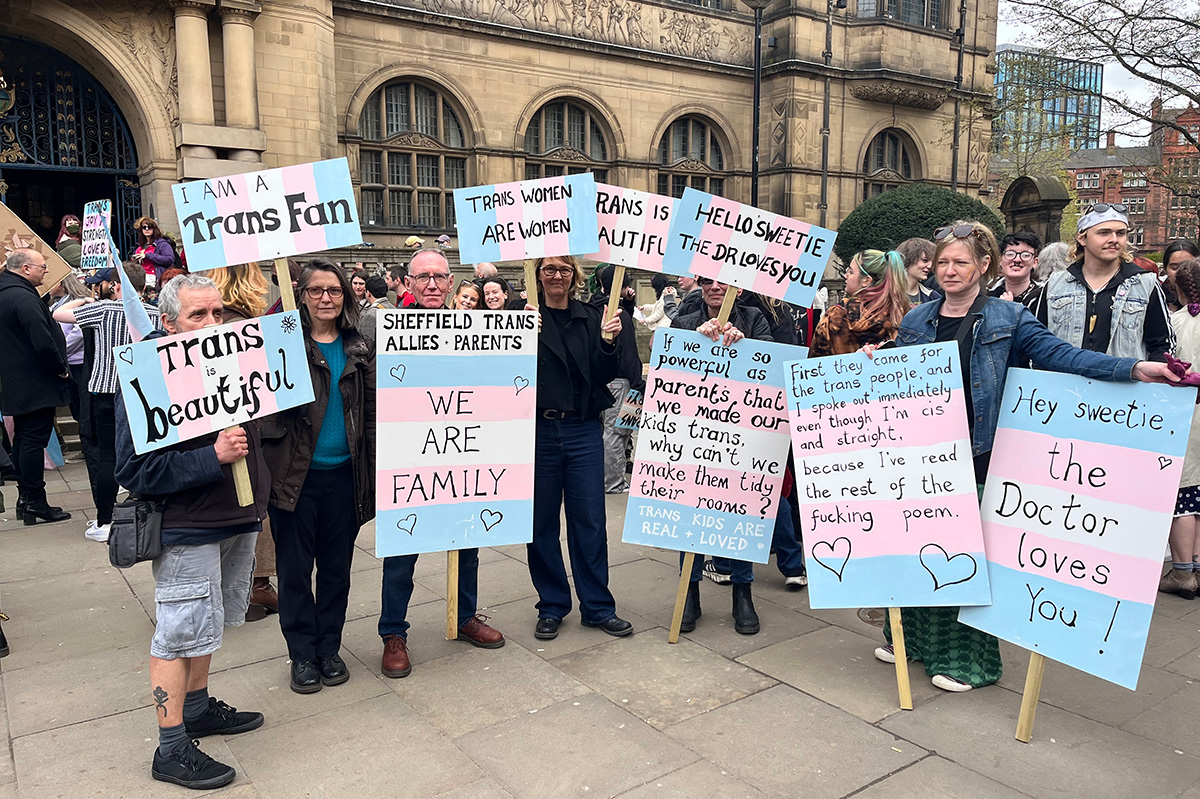
After last week’s U.K. Supreme Court ruling that reduced the legal definition of “woman” to “biological sex,” footage of a group of women celebrating the decision with champagne spread virally across the media. These women are known as trans-exclusionary radical feminists, or TERFs.
In response, thousands of transgender people and their allies — including parents, siblings, and pro-trans celebrities — flooded the streets of London, Sheffield, Manchester, Cardiff, and other cities across the U.K. on April 19, to protest the erosion of trans rights. The fight between TERFs and trans* people have become more visible to those outside of the British LGBTQ+ community.
But this isn’t just about the U.K. The problem has gone global. For me, as an openly trans person who has lived in four different countries, it feels deeply personal.
For years, British TERFs have been spreading misinformation about gender around the globe, collaborating with far-right politicians and inspiring anti-trans violence.
At a pro-trans protest I attended in Sheffield, one of the speakers, Sofia Alatorre, a trans woman from Mexico now living in the U.K., dedicated her speech to the ways British TERFs, with their powerful movement supported by celebrities, such as “Harry Potter” author JK Rowling, are influencing people in South America.
“When I go to Mexico now, I don’t just hear people talking about transsexuals as degenerates anymore. Instead I hear about what bathroom we should use, or whether we belong in sports,” Sofia told the Washington Blade. “These are not lines that come from Mexico. They are finely crafted narratives designed to drive a wedge by weaponizing ‘common sense’ gut reactions to complicated subjects. Because without these, they’d have to face the uncomplicated reality: We are just people trying to live our lives happily. In the U.K., the entire media infrastructure is sympathetic with ‘gender critical’ TERF ideology to the point that sympathy blurs into outright support. With these lines finding footing in the Global South, it seems clear that the U.K. has become an exporter of transphobia.”
Unfortunately, TERFs even showed up at a trans event, attempting to argue with the speakers.
One of the trans* organizers of the Sheffield demonstration, who preferred to remain anonymous, expressed their love for the trans* community and trans* people. They emphasized that they are not expressing hatred toward TERFs — they simply want them to reconsider their position.
“If you’re a TERF and reading this, we don’t hate you,” they said. “We don’t hate you. There is nothing I hold in my heart but deep pity for you. You do not know the community of love that we have as transsexuals, and you only know your community of hatred. If you are tired of feeling nothing but hate, come and talk to us, we’re nice, I promise. This protest is a rallying cry that we can’t lose, that we are all here for each other, and that we can do whatever the f*ck we want when we work together. We may be out here today in rage, but what keeps us alive is love.”
But it doesn’t seem like TERFs are ready to show love toward trans people — or to see trans women as their sisters. At our local protest in Sheffield, they were so agitated, jumping toward speakers and trying to engage with them, that the police had to intervene and remove them to prevent a fight. It reminded me of TERFs’ behavior I encountered in St. Petersburg, Russia, and in Russian-language online spaces.
Unfortunately, it’s not just South America that has been influenced by UK TERFs. The country I currently live in is known within European and U.S. queer communities as “TERF Island.”
Some trans Americans even avoid traveling to the U.K., afraid of the influence that Rowling holds over millions due to her wealth and cultural impact.
In Russia, Ukraine, and other Eastern European countries, so-called “radical feminism” is the most prominent feminist movement. Radical feminism, which emerged in the 1960s, is based on the belief that patriarchy is the root of all other forms of oppression.
In modern Eastern Europe, this has led to a situation where many feminists fail to acknowledge racism, ableism, and transphobia — excluding everyone except cisgender people, Slavic, atheist, and able-bodied people from their movement. Historically, radical feminists have not focused much on the trans* community, but with the rise of trans* activism in the 2000s, many became fixated on targeting trans people.
Many of my Russian-speaking trans friends have been badly bullied by local TERFs. Some even experienced suicidal thoughts and severe anxiety due to online harassment from them. And these TERFs weren’t developing their ideology locally — they were importing it. The anti-man rhetoric was inherited from American prominent radical feminists like Andrea Dworkin and Ti-Grace Atkinson, while the transphobic elements were “exported” to Eastern Europe, primarily from the U.K. and specifically Scotland.
Even before Rowling, there was Magdalen Berns, a Scottish TERF YouTuber who was extremely popular among Russian girls and women. It was Berns who helped bring Rowling into anti-trans activism.
I spoke with Sophie Molly, a Scottish trans activist and politician who ran as an Independent MP candidate in the 2024 U.K. general election for the Aberdeen South constituency.
TERFs ruthlessly harassed her during her campaign.
“Transphobia is institutionalized in the UK. It is systemic and it’s getting worse with each passing day” she told me. “Local TERF have a slew of legal professionals on their team too. Like Sarah Phillimore and Joanne Cherry. TERFs have been continually lobbying the government to oppress trans and gender non-conforming people. Dragging their rights and freedoms through the courts. All under the pretense of protecting the rights of women. In reality these conservative groups are backed and funded by billionaires. Billionaires that want to remove trans people from public life, due a personal prejudice they hold. The majority of TERFs are wealthy and privileged white women. Most of them are not LGBTQIA+. They have obscene amounts of money to spend on persecuting a tiny minority. Trans women are women — no matter what the U.K. Supreme Court dictates.”
But another problem of TERFs is that they are policing women as well. Even the Supreme Court decision targeted women.
“The [Supreme Court] decision is an attack on the rights of both trans people and women,” Sophie said. “It reduces women to their anatomy, which is extremely regressive and misogynistic in my opinion”
Women for decades have fought to ensure their lives wouldn’t be defined by the sexual organs they were born with. TERFs are now doing exactly that — attempting to reduce womanhood to biology, while also dictating how women should behave, all in the name of “sisterhood.”
Modern British TERFs have received support from figures like musician, far-right influencer, and convicted murderer Varg Vikernes, as well as ultra-conservative organizations such as the Russian Orthodox Church, an institution notorious not only for justifying the war in Ukraine with homophobic rhetoric but also for its long history of opposing women’s rights. This kind of “feminism” is a global threat, not only to trans* people but also to girls and women everywhere.
Editor’s note: The author uses trans* in order to be inclusive of nonbinary and gender queer people.
Commentary
America’s detransition: The far-right’s coordinated attack on climate policy and trans rights
Progress framed as ‘mistake that must be undone’

What if the far-right’s endgame isn’t just stopping progress, but erasing it altogether? From banning trans healthcare to reversing climate policies, they aren’t just resisting change — they’re trying to force the world back into an imaginary past that never existed.
Across climate policy and trans rights, the right isn’t just opposing change — it’s actively detransitioning America, unraveling progress under the guise of “common sense” and “restoring order.” But this isn’t just about ideology. It’s about power.
From pulling out of the Paris Agreement to banning gender-affirming healthcare, the right has perfected a political strategy that frames progress as a mistake that must be undone. Whether it’s climate action or trans visibility, any step toward justice is framed as dangerous, unnatural, and in need of correction.
And if we look closer, these attacks aren’t just similar — they are deeply connected. By comparing the right’s climate rollbacks and its war on trans rights, we can see a broader strategy at work: One that fuels fear, manufactures doubt, and ultimately serves the interests of those already in control.
The fight isn’t just about policy. It’s about who gets to belong in the future.
The manufactured crisis: Who profits from reversal?
To justify rolling back both trans rights and climate protections, the right leans on manufactured crises — presenting change as a dangerous social experiment gone wrong. And the most effective way to do that? Weaponizing doubt.
Take climate change. Despite overwhelming scientific consensus, climate denialists cherry-pick uncertainties — using rare instances of changing climate models to cast doubt on the entire field.
Similarly, the right has latched onto detransition stories, amplifying a handful of cases where individuals regret transitioning to suggest that all trans people will regret their identities.
By focusing on individual regret rather than systemic realities, these movements create the illusion that climate action and trans healthcare are harmful mistakes rather than necessary progress. The message is clear: We must “correct” these wrongs by detransitioning the country back to a time before this supposed damage occurred.
But who actually benefits from this rollback?
- Fossil fuel companies profit from climate skepticism, ensuring we remain dependent on dirty energy.
- Right-wing politicians fundraise off anti-trans fearmongering while avoiding economic issues that might actually improve people’s lives.
By making people believe they are “fighting back” against elites, the right obscures the actual elites profiting from this manufactured outrage.
The spectacle: Turning trans lives and climate policy into distractions
None of this would work without media spectacle. Right-wing politicians and media outlets know that the most effective way to keep people from questioning power is to keep them emotionally invested in a performance.
Take the far right’s obsession with trans youth. They flood the airwaves with panic over puberty blockers, despite the fact that gender-affirming care is exceedingly rare.
A peer-reviewed study analyzing private insurance claims found that out of more than 5 million adolescents ages 8 to 17, only 926 received puberty blockers and 1,927 received hormone therapy between 2018 and 2022.
Similarly, climate policies are attacked as elitist schemes to control the working class — painting green energy initiatives as an attack on personal freedom, just as gender-affirming care is framed as an attack on children.
By shifting the focus onto symbolic enemies — the “radical trans activist” or the “climate elitist” — the right gives people someone to hate while avoiding the real sources of economic and environmental crisis.
And this isn’t just a cultural strategy. It’s a business model.
Capitalism is in the business of creating problems, then selling solutions.
- Oil companies push carbon capture technology while continuing to pollute — ensuring the crisis is never fully solved, only managed.
- The right promotes “detransition support” while banning trans healthcare, creating a crisis where one didn’t exist.
Both strategies ensure that nothing actually changes, while making people feel like they’re participating in a fight for freedom.
It’s a distraction, and it’s working.
Nature as a battleground: The far-right’s fear of fluidity
At its core, the war on trans people and the war on climate action stem from the same fear: The fear of change.
Queer ecology tells us that nature itself is fluid, adaptive, and in constant transition. Yet, the far-right insists on rigid, binary categories:
- Man/Woman.
- Fossil Fuels/Renewables.
- Traditional/Disruptive.
In both cases, fluidity is framed as unnatural — something that must be controlled through political intervention.
- Fossil fuels are labeled “natural” energy, while renewables are framed as “forced” and “unnatural”—a rhetorical tactic explored in a 2025 study on far-right climate discourse.
- Trans identities are labeled “unnatural choices,” requiring government bans to prevent people from making “mistakes.”
But what’s truly unnatural? The attempt to freeze society in time. The climate has always changed. Gender has always been fluid. The far-right isn’t defending nature — they’re defending control.
The far-right’s detransition obsession mirrors climate rollbacks
Capitalism is not interested in actual progress — it only cares about control.
The obsession with detransition mirrors climate rollbacks in that both are framed as necessary corrections to a mistake.
- The Paris Agreement withdrawal was presented as a return to “energy independence.”
- Trans bans are framed as returning to “biological reality.”
But the goal isn’t returning to a real past. It’s about constructing a version of the past that justifies present oppression.
- Climate denial isn’t about scientific debate — it’s about maintaining corporate power, as Time reported in 2025.
- Anti-trans laws aren’t about protecting kids — they’re about enforcing gender hierarchies, according to a 2025 New York Times editorial.
Neither of these rollbacks is accidental. They are part of a deliberate strategy of control — one that tells us that progress is always temporary and can always be reversed.
Who owns the future?
If we allow the right to detransition America, we risk a world where progress is always reversible, and power remains in the hands of those who benefit from disorder and fear.
The real question isn’t whether these issues are linked — it’s why they were ever separated to begin with. The fights for climate justice and trans rights are one and the same:
- A fight against the illusion of permanence.
- A fight against manufactured crisis and controlled reversal.
- A fight for a future that actually belongs to all of us.
So what do we do?
- We must refuse to accept their manufactured doubt — trans rights and climate action are not mistakes that need fixing.
- We must reject their false nostalgia — there is no past to return to, only a future to create.
- And most importantly, we must recognize that these struggles are connected.
If we fail to see this, we risk allowing reactionary forces to shape the future. But if we understand their playbook, we can disrupt the spectacle and refuse to let them dictate what comes next.
Because this fight isn’t about going back. It’s about moving forward — and making sure no one can take that future away.
Cody Hays is a Ph.D. student at Arizona State University’s Walter Cronkite School, researching media psychology, public understanding of science, and digital misinformation, with a focus on ideological worldviews; they are a Graduate Research Fellow in the MIDaS and Views and Values Labs, executive editor of the Journal of Public Interest Communications, and a nonprofit communications strategist with over a decade of experience in combating disinformation and mobilizing action.
Commentary
History of D.C. Pride: 1995-2007, a time of growth and inclusion
Rainbow History Project plans expansive WorldPride exhibit

In conjunction with WorldPride 2025 the Rainbow History Project is creating an exhibit on the evolution of Pride: “Pickets, Protests, and Parades: The History of Gay Pride in Washington.” In “Freedom on America’s Main Streets,” we discuss how during the 1990s the LGBTQ communities became more prominent across all areas of American life, the circumstances of moving official Pride activities to Pennsylvania Avenue, and the origin of the name “Capital Pride.”
Throughout the 1990s, LGBTQ visibility increased significantly in American society. The LGBTQ community’s presence extended beyond news coverage of AIDS activism, with members participating in various social movements. Gay Black men joined the Million Man March in 1995, carrying banners and signs proclaiming “Black by Birth, Gay by God, Proud by Choice.” Lesbians led abortion-rights rallies, LGBTQ Asians joined Lunar New Year parades, and LGBTQ Latinos marched in Fiesta DC.
Once again, financial difficulties around Pride activities led to the dissolution of the Gay and Lesbian Pride of Washington as an organization and the gay arts and culture non-profit One in Ten took over organizing Pride. One in Ten’s mission was not solely Pride planning, but rather year round activities, including an attempt to make an LGBTQ history museum. Due to the explosion of activities, the crowd sizes, and the growing concerns around feelings of exclusion brought on by the neighborhood’s identity as a primarily gay white male space, in 1995, One in Ten moved the Pride parade and festival out of Dupont Circle to Freedom Plaza on Pennsylvania Avenue.
Although the struggle for bisexual visibility had successfully added the B to the 1993 March on Washington, the push to add Trans and Queer identities to Gay Pride’s name was not yet successful; Pride was reborn as The Freedom Festival. Two years later, in 1997, the Whitman-Walker Clinic became not just a sponsor but also a co-organizer to alleviate some of the organizational and financial challenges. It was during this time that the event was officially renamed Capital Pride.
The name change sparked debate within the community. Frank Kameny, who had organized the 1965 pickets, harshly criticized the new name, arguing that it “certainly provides not an inkling of what we really mean: Pride that we are Gay.” He lamented that the name change “represents Gay shame.” However, others celebrated the inclusivity of the new name. L. A. Nash, a self-identified lesbian, wrote, “Gay is good—Gay, Lesbian, Bisexual and Transgender is far better.” Elke Martin further supported the change, stating, “A name is your identity, it gives you legitimacy and a seat at the table.” Capital Pride’s official name was now “Capital Pride Festival: A Celebration of Lesbian, Gay, Bisexual, Transgendered Community and Friends.”
In April 2000, the Millennium March on Washington highlighted divisions within the gay civil rights movement. Unlike previous grassroots marches organized by local activists, this event was orchestrated by national organizations like the Human Rights Campaign. However, its Millennium Pride Festival was by far the largest event with major headliners performing, including Garth Brooks and Pet Shop Boys. Critics argued that these events represented a corporatization of activism that sidelined political demands and local groups struggling for recognition.
In 2001, Capital Pride events were attracting 100,000 attendees. The festival was held on Pennsylvania Avenue with the U.S. Capitol in the background of the main stage. This location, often referred to as “America’s Main Street,” symbolized a significant visibility boost for the LGBTQ community. However, the Washington Post failed to cover the event beyond a simple listing in its events calendar. The outrage that ensued led Capital Pride director Robert York to state: “This is the biggest and best Pride we’ve had, and it is important to see it covered other than in the gay press.”
It wasn’t until 2007, however, that SaVanna Wanzer, a trans woman of color and Capital Pride board member, successfully established Capital Trans Pride. “The transgender community needs its own event,” Wanzer stated, “rather than just using us as entertainment. That’s all we’ve been allowed to do.” Trans Pride’s creation was a significant step toward greater inclusivity within the LGBTQ community.
Our WorldPride 2025 exhibit, “Pickets, Protests, and Parades: The History of Gay Pride in Washington,” will be installed on Freedom Plaza on May 17 to coincide with DC Trans Pride. We need your help to make it happen.




















